Serving 340 students in grades 4-6, Rogers Es ranks in the bottom 50% of all schools in Oklahoma for overall test scores (math proficiency is bottom 50%, and reading proficiency is bottom 50%).
The percentage of students achieving proficiency in math is 4% (which is lower than the Oklahoma state average of 25%). The percentage of students achieving proficiency in reading/language arts is 7% (which is lower than the Oklahoma state average of 27%).
The student:teacher ratio of 17:1 is higher than the Oklahoma state level of 15:1.
Minority enrollment is 88% of the student body (majority Black), which is higher than the Oklahoma state average of 56% (majority Hispanic and American Indian).
Quick Stats (2025)
- Grades: 4-6
- Enrollment: 340 students
- Student:Teacher Ratio: 17:1
- Minority Enrollment: 88%
- Overall Testing Rank: Bottom 50% in OK
- Math Proficiency: 4% (Btm 50%)
- Reading Proficiency: 7% (Btm 50%)
- Science Proficiency: 6-9% (Btm 50%)
- Source: National Center for Education Statistics (NCES), OK Dept. of Education
School Overview
Rogers Es's student population of 340 students has grown by 18% over five school years.
The teacher population of 20 teachers has stayed relatively flat over five school years.
Grades Offered
Grades 4-6
Total Students
340 students
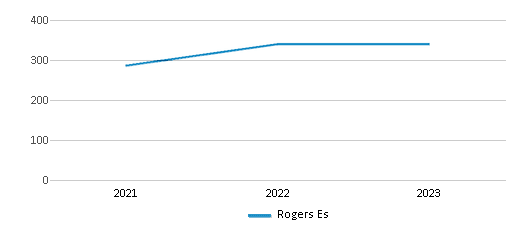
Gender %
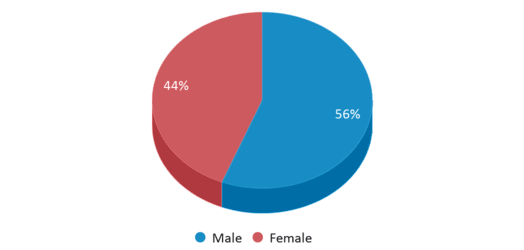
Total Classroom Teachers
20 teachers
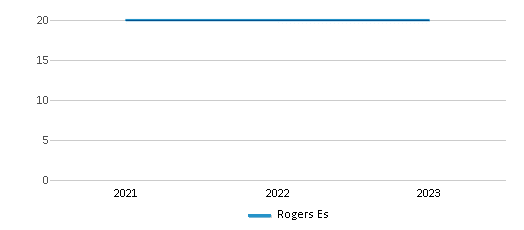
Students by Grade
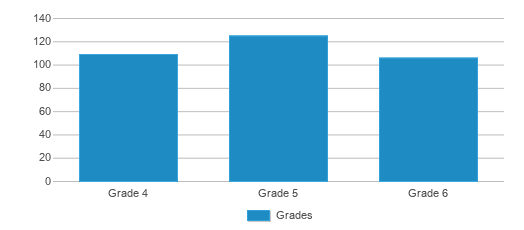
School Rankings
Rogers Es ranks within the bottom 50% of all 1,680 schools in Oklahoma (based off of combined math and reading proficiency testing data).
The diversity score of Rogers Es is 0.60, which is less than the diversity score at state average of 0.73. The school's diversity has stayed relatively flat over five school years.
Overall Testing Rank
#1654 out of 1680 schools
(Bottom 50%)
(Bottom 50%)
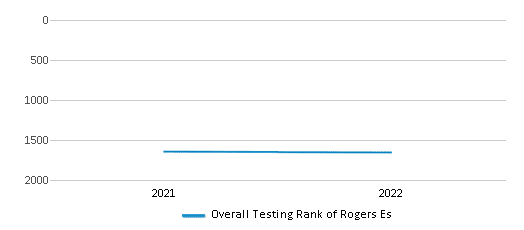
Math Test Scores (% Proficient)
4%
25%
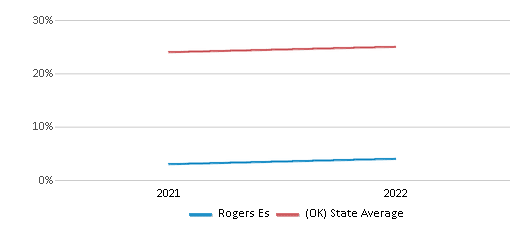
Reading/Language Arts Test Scores (% Proficient)
7%
27%
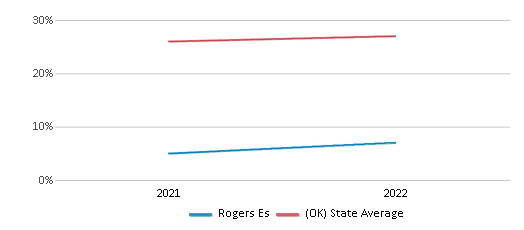
Science Test Scores (% Proficient)
6-9%
31%
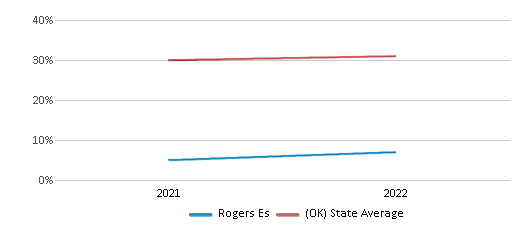
Student : Teacher Ratio
17:1
15:1
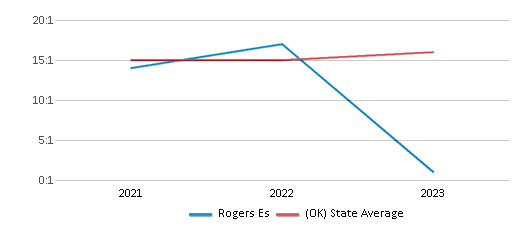
American Indian
3%
11%
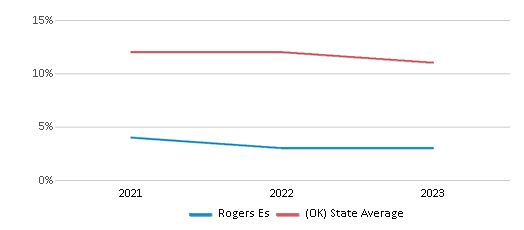
Asian
n/a
2%
Hispanic
15%
20%
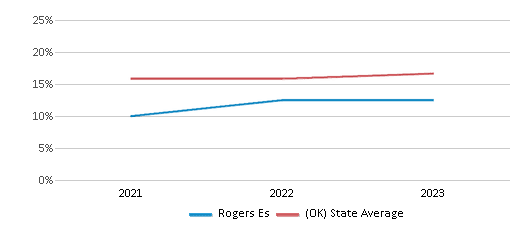
Black
60%
8%
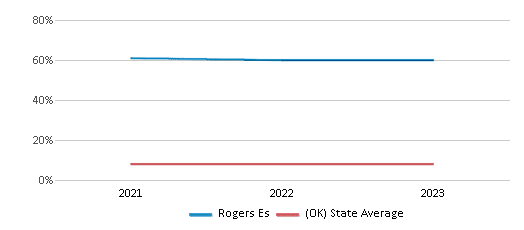
White
12%
44%
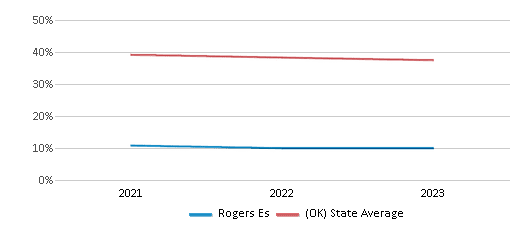
Hawaiian
2%
1%
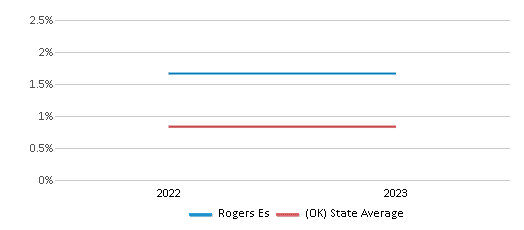
Two or more races
8%
14%
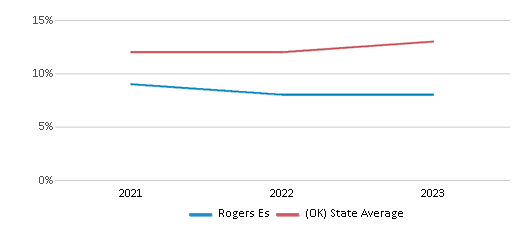
All Ethnic Groups
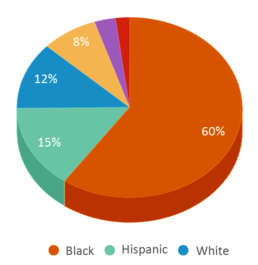
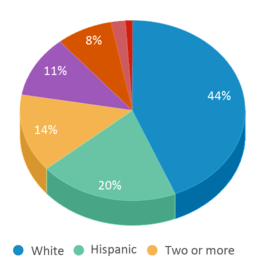
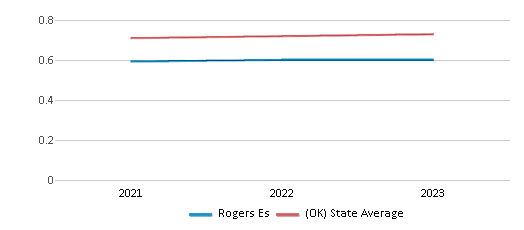
Participates in the National School Lunch Program (NSLP)
Yes
School Statewide Testing
School District Name
Source: National Center for Education Statistics (NCES), OK Dept. of Education
Profile last updated: 02/09/2025
Frequently Asked Questions
What is Rogers Es's ranking?
Rogers Es is ranked #1654 out of 1,680 schools, which ranks it among the bottom 50% of public schools in Oklahoma.
What percent of students have achieved state testing proficiency in math and reading?
4% of students have achieved math proficiency (compared to the 25% OK state average), while 7% of students have achieved reading proficiency (compared to the 27% OK state average).
How many students attend Rogers Es?
340 students attend Rogers Es.
What is the racial composition of the student body?
60% of Rogers Es students are Black, 15% of students are Hispanic, 12% of students are White, 8% of students are Two or more races, 3% of students are American Indian, and 2% of students are Hawaiian.
What is the student:teacher ratio of Rogers Es?
Rogers Es has a student ration of 17:1, which is higher than the Oklahoma state average of 15:1.
What grades does Rogers Es offer ?
Rogers Es offers enrollment in grades 4-6
What school district is Rogers Es part of?
Rogers Es is part of Oklahoma City School District.
School Reviews
Review Rogers Es. Reviews should be a few sentences in length. Please include any comments on:
- Quality of academic programs, teachers, and facilities
- Availability of music, art, sports and other extracurricular activities
Recent Articles

Sexual Harassment at Age 6: The Tale of a First Grade Suspension
A six-year old in Aurora, Colorado, was suspended after singing an LMFAO song to a little girl in his class and reportedly “shaking his booty.” We look at the case and the sexual harassment problem in public schools today.

How Scaffolding Could Change the Way Your Child Learns
This article explores the concept of instructional scaffolding, a teaching method that enhances learning by breaking down complex tasks into manageable parts. It highlights how scaffolding supports students in developing critical thinking skills and becoming more independent learners. The article discusses the benefits of scaffolding, including improved engagement and reduced anxiety, and provides strategies for its implementation across various educational levels.

February 05, 2025
Understanding the U.S. Department of Education: Structure, Impact, and EvolutionWe explore how the Department of Education shapes American education, from its cabinet-level leadership to its impact on millions of students, written for general audiences seeking clarity on this vital institution.






